Trevor John Leclerc, teacher-spokesman-politician-survivor
“… life isn’t fair, the universe isn’t fair. But people have free will and we have the unique capacity to try to make it a little fairer.”
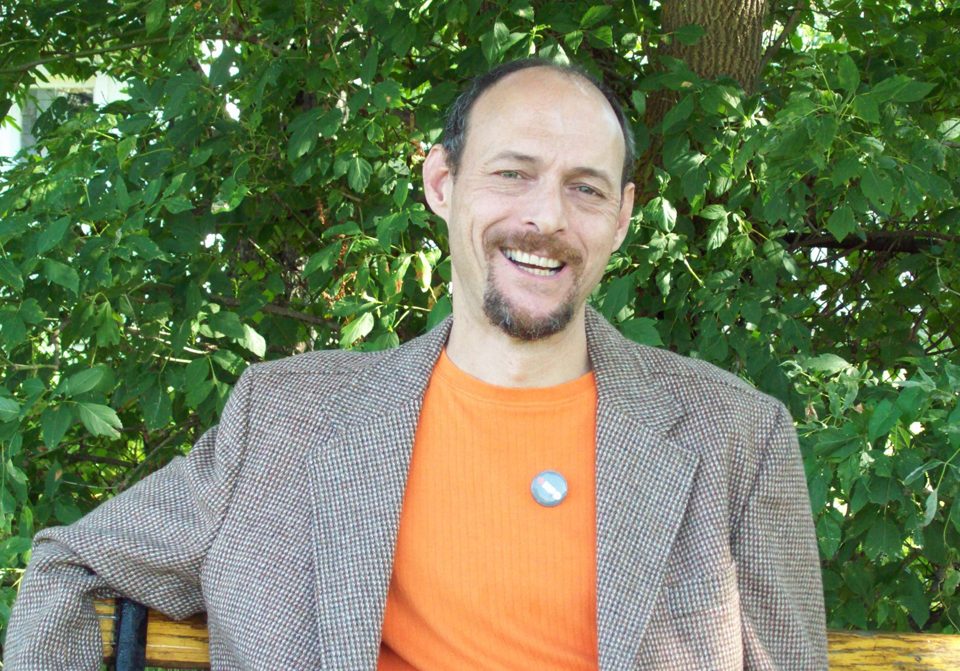
Talking to Trevor John Leclerc is a pleasure. He’s eloquent, articulate and concise, and commands an impressive vocabulary. You’d never guess he suffered a massive stroke 10 years ago, one that left him with short-term memory deficits, struggles with balance, difficulty with social cues, mild dysphonia and partial paralysis on his left side. Fifteen percent of his brain is now composed of scar tissue.
But there’s much more to his story than just the stroke.
When I met Trevor in 1990, he went by TJ and headed the acting program Trevor John Studios. He taught me, along with Kickass Canadians Matthew Edison, David Hein and Hannah Moscovitch, as well as a host of other young Canucks who went on to great success in the arts, including photographer Chloe Lewis and actor-producer Anne Lishman.
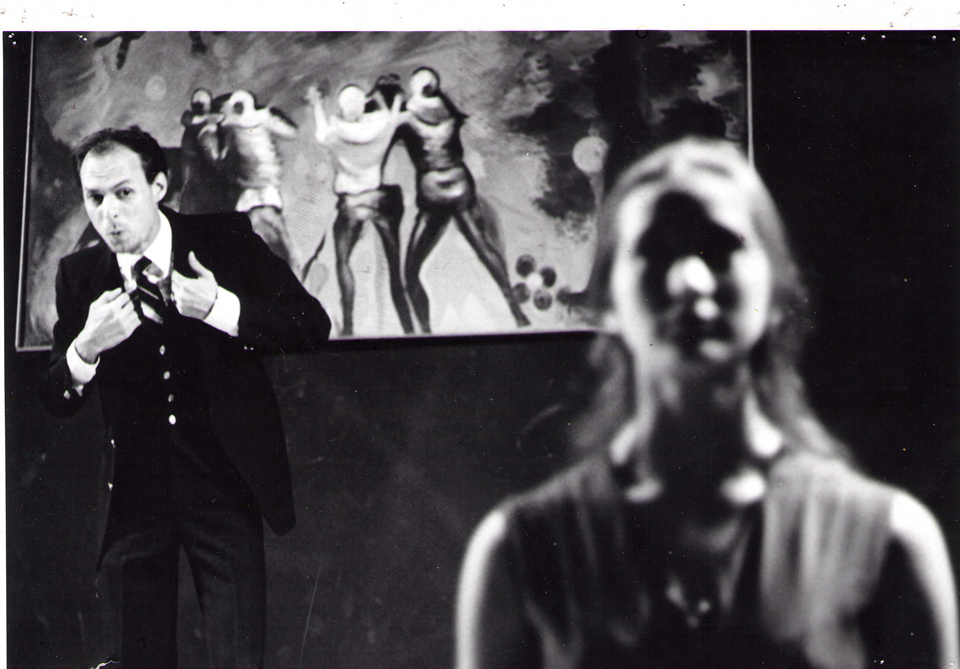
Trevor (left) with Kickass Canadian Hannah Moscovitch in ‘Antigone,’ TJS, 1994
Trevor has always held a special place in my heart. His kindness, sincerity and honesty, combined with an uncanny talent for listening as well as he speaks, made him one of the first people I opened up to. When we met more than two decades ago, I saw him as a father figure of sorts. His journey over the past 10 years has given me even greater appreciation for the remarkable and inspiring person he is.
Since his stroke at age 37 in October 2000, he’s been through a lot. His 13-year marriage to the mother of his children fell apart. He was forced to stop working and go on disability before the age of 40. He entered a deep depression, and moved to Charlottetown, Prince Edward Island, thinking of retreating from the world. But he quickly discovered he was meant for much more than that. In Charlottetown, he openly revealed his bisexuality—something he’s known about himself from a very young age—and found love again with a long-term partner, a man this time. And he became an advocate for improving stroke rehabilitation on the island.
Trevor also entered the world of politics. Most recently, he ran in the 2011 provincial election as the NDP candidate for MLA in the Charlottetown-Brighton district. He didn’t get elected—the title went to Liberal incumbent and PEI Premier Robert Ghiz—but Trevor did earn 7.57% of the votes, surpassing his 7% goal. “I didn’t get elected, but I won 165 times,” he says.
His determination, strength and optimism in the face of challenges that could easily, and understandably, break other people brings such a smile to my heart. He’s one of the warmest, most wonderful, witty, funny, informed and brave people I know, and it’s my great honour and joy to share his story with you.
Life before politics
Trevor was born in Kingston, Ontario, the youngest of four children and son of a military father—and also, he says, “a proud Mohawk, of the Bay of Quinte Mohawks, by virtue of my mother’s and grandmother’s band membership.” The Leclerc children spent their early years moving around Canada, bopping from Ontario to New Brunswick to Quebec. In 1976, when Trevor was 13 years old, his father was made General and posted to Holland, taking the family with him and transporting their bopping from Canada to Europe.
The constant moving, combined with the fact that Trevor had been bumped up a couple grades in school, made him feel like something of a misfit among his peers. “You’re two years younger than everyone in your grade; that’s kind of like social death,” he says. “So, you spend a lot of time in the library or at home reading books. My best friend growing up was Dr. Isaac Asimov.”
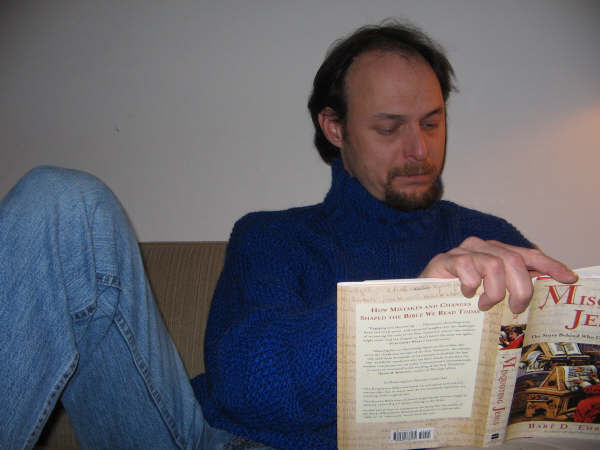
In good company with one of his beloved books
After graduating from AFCENT International School in Brunssum, Netherlands, Trevor moved back to Canada in 1979, leaving his parents behind. He was only 16 and “wasn’t ready to handle going off to university alone,” so he took up with his elder sister at her farm in Ashton, Ontario. By then, he’d been bitten by the acting bug, so it wasn’t long before he moved into the Big Smoke—Ottawa—to pursue his craft.
A flair for the dramatic
While working in software verification at Mitel, Trevor got busy building up his acting résumé. When he auditioned for Theatre 2000, which he calls the precursor to the Great Canadian Theatre Company (GCTC), he not only landed his first professional gig, in a play called Nurse Jane Goes to Hawaii, but received a boatload of other acting offers. At age 20, he committed himself to life as an actor.
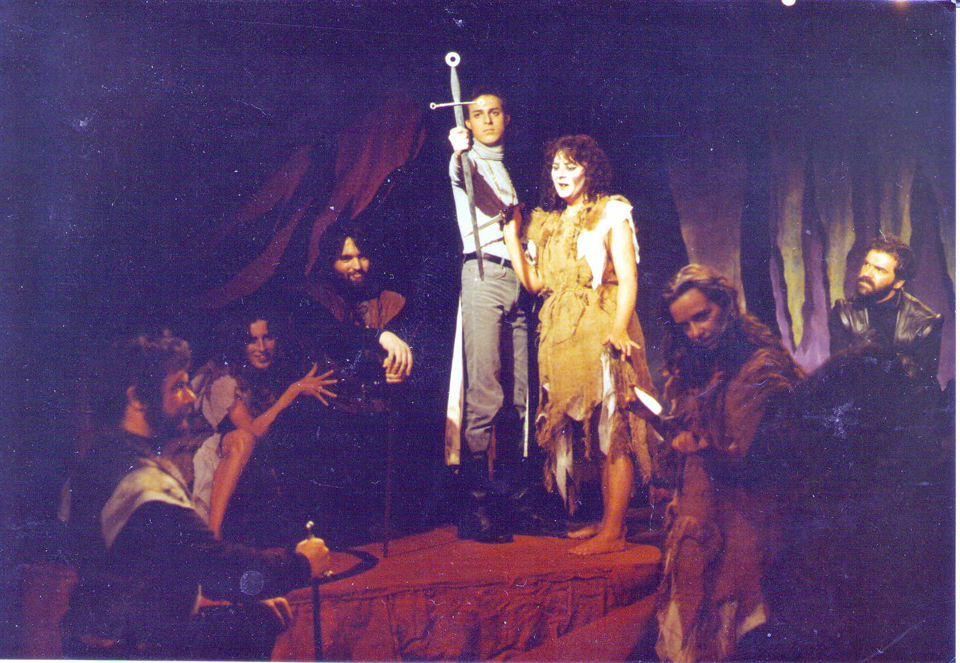
Trevor (centre) as Malcolm in ‘Macbeth,’ Stage Repertoire Ottawa, 1984
After a couple years taking commercial work for radio and a lot of roles with Odyssey Theatre, he was approached about teaching after-school drama to elementary school students within the Ottawa Board of Education (now the Ottawa-Carleton District School Board). He began at Broadview Public School once a week, and before long, was teaching nine- to 13-year-olds at different schools every day of the week. “I started to find that I was enjoying teaching a lot more than I was enjoying acting,” he says.
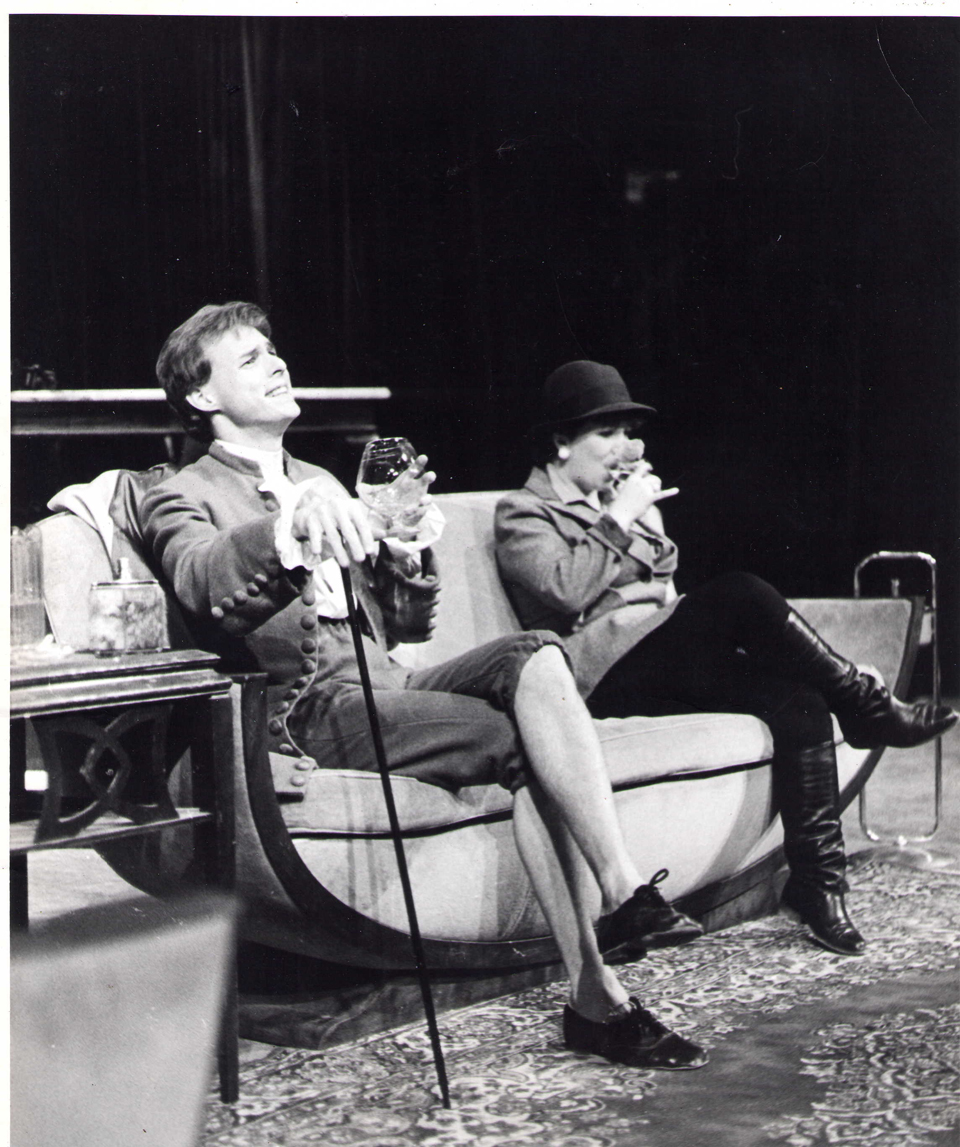
Trevor (left) as Sir Isaac Newton in ‘The Physicists,’ Unicorn Theatre Productions, 1984
When the 13-year-olds moved up to high school and were no longer eligible for his classes, he knew he had to do something to remedy the situation. “We’d grown attached to each other at that point and we were starting to really do some interesting stuff together,” he says. After discovering that Arts Court was renting out some of its rooms, he jumped at the opportunity, booked a space on Saturdays and opened Trevor John Studios (TJS) in 1986.
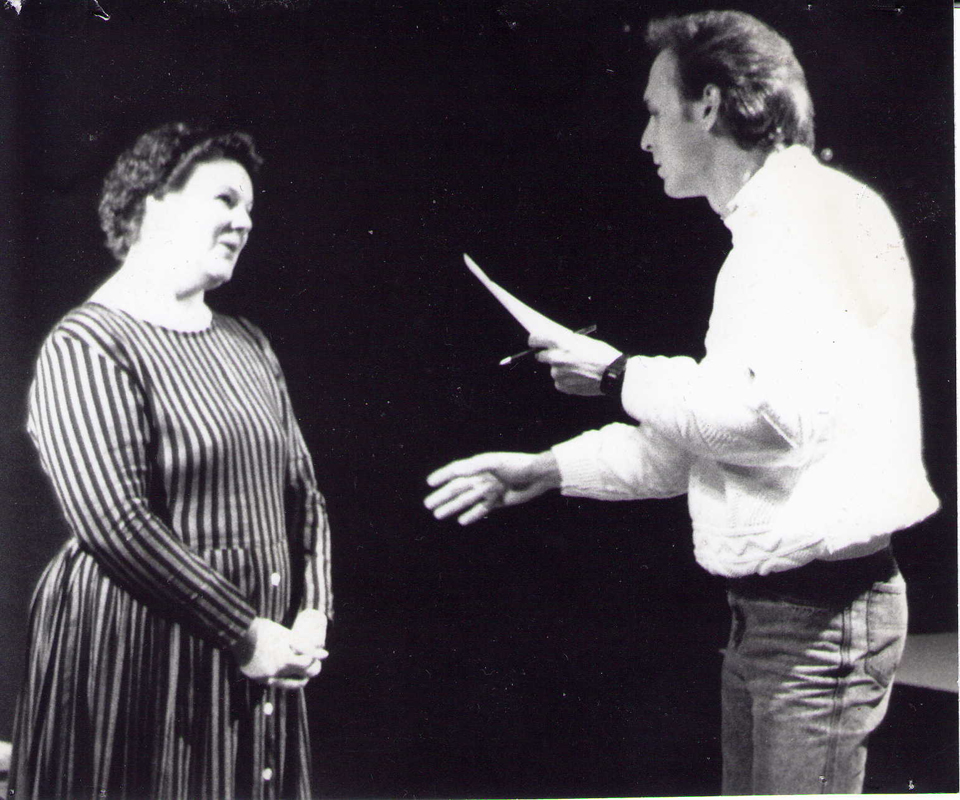
Trevor (right) directing ‘Queen of Pawns,’ TJS, 1986
A few years later—after meeting and marrying Jackilyn Leclerc, and welcoming children Red and Christopher into the world—Trevor left Arts Court to open his own studio on Gladstone Avenue, not far from GCTC’s old haunts (for those of you who know Ottawa). TJS offered Trevor the opportunity to “work with a bunch of talented young people and give them an outlet that they weren’t going to have anywhere else,” he says. In the studio’s five-year run, it enjoyed a reputation for producing some of the most innovative and inventive shows around. “CBC was calling us the smallest, most active theatre centre in our part of the world.”
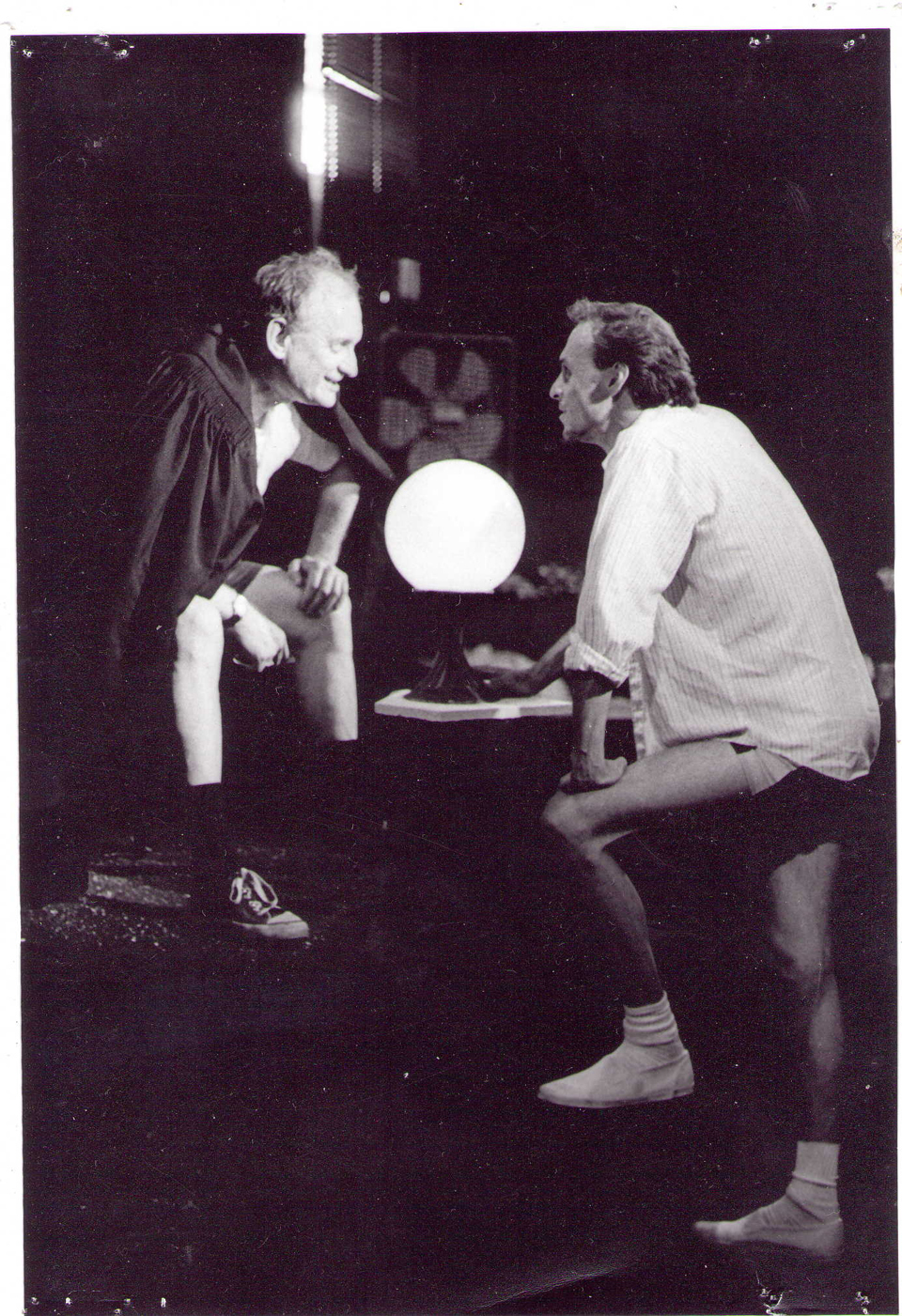
Trevor (right) as Satan in ‘Dialogue,’ TJS, 1995
A stroke of change
In 1999, Trevor shut the doors on TJS. After years of producing a new show every three months, he was “completely burned out, just too tired.” His body may have been trying to tell him something.
He found work at the University of Ottawa Heart Institute (UOHI) as a secretary to the Vice-President of Nursing and was soon made permanent. Then, on October 29, 2000, he suffered a massive stroke. In hindsight, he realized the slurred speech, blurred vision and impaired motor skills that had presented briefly in the days prior weren’t just meaningless episodes. But until the major stroke hit, he had no idea what was coming.
Looking back on the experience, he wrote the following as part of an essay for the Citizen Weekender Magazine:
“I certainly never imagined that a clot could travel to my brain and literally within a heartbeat change my life so radically…”
In the days after his stroke, Trevor was told that it had occurred because his immune system had inexplicably developed the antibody to combat lupus. But he didn’t have the disease, so the antibody, having nothing to fight, turned on itself and created a small but potentially lethal blood clot.
During his six-week stay at the Ottawa Hospital Rehabilitation Centre, he learned how to manage his physical condition with a blood thinner and vigilant diet. He learned to improve his speech and work towards regaining movement in his left side. By the time he left the Centre, he was good as new, ready to hit the ground running and return to work at UOHI. Or so he urgently needed to believe.
“I was in such a state of denial,” he says. “I was convinced that nothing bad had happened. I honestly thought that nothing was wrong. But (my family and colleagues) could see different.” He was left with no choice but to leave his position in the nursing department and apply for disability.
In so doing, he entered the darkest period of his life. Within two years, his marriage fell apart. Divorced and living alone, he was bitter, defeated, and angrier at having survived his stroke than at having had it at all. “I felt really diminished,” he says. “I didn’t respect me. I felt like a pathetic child again. Everything was too busy, too fast, a constant reminder that I couldn’t cope the way I used to, that I was inadequate and failing.”
East coast revival
Trevor tried to stay involved in the community, continuing to lead a discussion group for seniors at the Heron Road Community Centre for the City of Ottawa’s Department of Recreation and Culture. But he was profoundly unhappy, and deeply resented the limitations imposed by his stroke.
In 2007, desperate for a change from the city that reminded him of what his life used to be, and with his children grown and starting their own lives, he moved to Charlottetown looking for nothing more than a quiet place to carry out his life in peace. But Trevor isn’t the kind of person who can sit idly by and do nothing. He never has been.
When he arrived in PEI, he saw a sign that read: “Acute Stroke Care Now!” He wandered into the building where the sign was posted, discovered that there was no acute stroke unit in the province, and set about lobbying to bring Islanders the same high-quality medical care that stroke survivors have in Ontario. He also joined AIDS PEI, going on to become one of its board members.
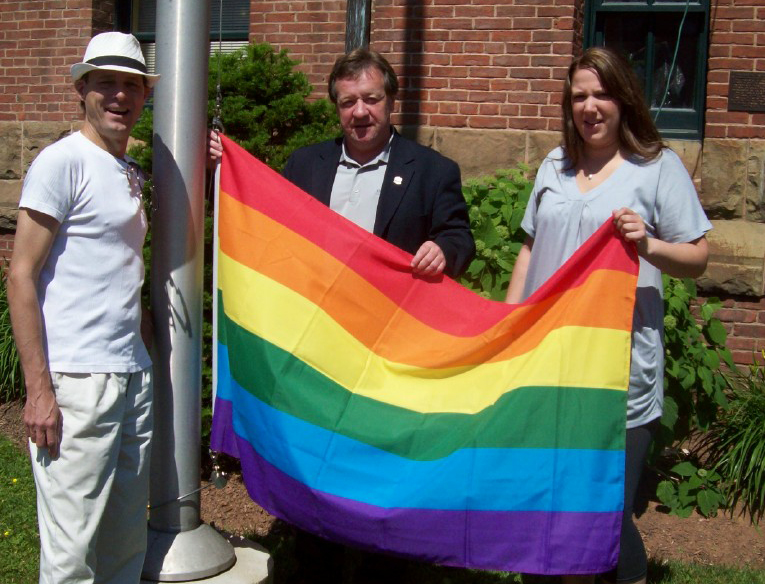
From left: Trevor, Charlottetown Mayor Clifford Lee and Director of AIDS PEI Alana Leard, hanging the gay pride flag
Stepping into the ring
Trevor’s activism, initiative and commitment to universal access and equal opportunity were just some of the qualities that led the New Democratic Party of Prince Edward Island to nominate him to run for MLA in his riding for the October 2011 provincial election. He thought long and hard about whether he’d be able to carry out the tasks required of him in the unlikely event that he won (the incumbent, and eventual winner, was beloved PEI Premier Robert Ghiz). But ultimately, his answer was “yes.”
“I have the capacity to make reasoned, careful and sound judgments at my own pace,” he says. “I cannot handle a chaotic, uncontrolled environment, but I can hear people out in a structured environment. Everything around a political environment is controlled and structured.”
In many ways, a job in politics was the only one he was suited for. Through his work with AIDS PEI and the Heron Road Community Centre, he’d proven he could lead meetings and carry out discussions post-stroke. His vast experience as an actor made him very comfortable with public speaking. More than that, though, he began to see that politics had been in his blood all along.
“I live surrounded by my books,” he says. “They have always been my best friends, always been my insight into this collective pool of wonderful knowledge and wonderful stories from around the world. History and drama and theatre; it’s all about the stories of people and passions. Isn’t politics the same thing?”
The final impetus to run came when he recalled the words of the late, great former NDP leader Jack Layton. “He said, ‘I will not be succeeded by one person; I will be succeeded by everyone in the movement, because it’s the movement that matters, not the individual,’” says Trevor. “That’s what impassioned me to run. When this provincial election was called and there was no NDP social democrat running, it was a situation that had to be rectified. So, I stepped up, and walking the streets, I found such a sense of energy and enthusiasm and passion that I can’t imagine not doing that again.”
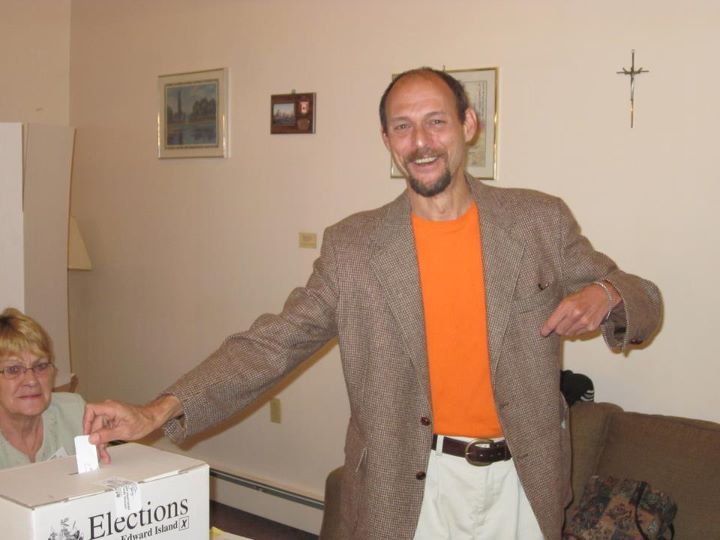
Casting his ballot (for himself!)
Of hope and dignity
On October 3, 2011, Trevor finished third in his riding, behind the Liberal and Progressive Conservative candidates. For him, it was just a warm-up.
“The election experience was transformative for me,” he says. “I’ve been spending the last 10 years since the stroke with a huge chip on my shoulder, trying to prove something. Ever since I got the nomination, I felt I had nothing left to prove. Not to myself or anyone else. Everything that I was so angry about, that I thought had systematically ruined every building block of my life… may have actually led to a complete rebirth in a direction I could never have anticipated and never would have had the opportunity for, had (the stroke) not happened. I would not have ended up in PEI. I would have stayed at home in Ottawa and I would never have been offered a prime riding (like Charlottetown-Brighton).”
These days, the only time he thinks about the state he was in when he went to PEI is when someone asks why he moved there. He has every intention of being “a major part” of the NDP presence in his province. It’s his goal to return to Islanders the gifts they gave him: Hope and Dignity, the two words upon which his platform rests.
“I came here having lost all dignity and with no hope,” he says. “After I arrived, it became clear to me that there are a lot of people suffering without hope and that they too felt that their dignity was under assault. (Throughout the campaign), my dignity was restored, and in having it restored, I had my own hope restored… I want to share my discovery with (the people of PEI) and let everyone know that they too can reclaim their hope and dignity.”
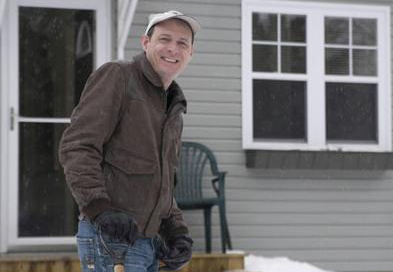
Happy at home in Charlottetown, PEI
Trevor is deeply passionate about standing up for his beliefs. But for him, it’s more than just a passion: it’s a duty. Though he’s on wonderful terms with his ex-wife and children, he says that moving away from his family gives him the liberty to openly declare himself bisexual, and to embrace life as a stroke survivor, without putting anyone but himself in jeopardy. “I’m in a position to confront the stigma and normalize it. If I can do something that no one else can, I have a duty to do it. It’s something I learned in the rehab centre: My good arm belongs to anyone who doesn’t have one.
“My son Chris always said when he was growing up, ‘It’s not fair.’ And I would say to him, ‘Life isn’t fair, the universe isn’t fair. But people have free will and we have the unique capacity to try to make it a little fairer.’”
* * *
For the latest on Trevor, ‘Like’ his Facebook page.
Keep your eyes peeled for his upcoming autobiography, tentatively called Ten Years After: Life After Stroke. The book is complete and Trevor is looking for a publisher; please feel free to contact him with queries.
 Kickass Canadians
Kickass Canadians
Great story! Trevor was a wonderful candidate in the recent election and has been an inspiration to many people.
Thanks Ron! Yep, Trevor’s story is amazing and there are many more chapters to come… Glad he has your support 🙂
Trevor: Well…you have been a great neighbour for some time now but, of course, I did not know all this! All I can say is ‘HELLO, Trevor, what a pleasure and an honour to fully realize and know the whole you! What a courageous and challenging story and journey you’ve been and are on. My wish and hope is that you continue to stay on your awesome path, in all areas of your life.
What a joyful read, and well articulated article.
May the Force be with you. Powerfully. Forward.
I look forward to that!
Mary (Wave, wave) Lovely morning!
Thank you so much for sending me this.
I’m in, wow, I don’t know if i have the words to express how I feel after reading this. What an inspiring story. I hope this brings comfort to those living with physical disability. I look forward to working with you at AIDS PEI and I wish you all the best in whatever you do, and after reading this story it can be anything. Way the go Trevor, I’ll vote for you anytime. All the best, your fellow board member Kay 🙂
Go Trevor Go. It was great working with you on the recent campaign. I am sure there will be more in the future.
Way to go Trevor! When I first met you, I was convinced that you were on some kind of a search (other than a new home). I am very happy to know you and am sure that you will be very successful in you newest journey!
Bravo!
Here is a Canadian who had his ass kicked. Only he could turn this around, literally, to be featured like this. I am honoured to be able to call him my brother.
Thanks for writing, Paul. I couldn’t agree more. Really happy to see such a positive response for Trevor!
Felicitations Trevor 🙂 It is the most difficult of journeys that are most valuable. You have re-earned the self-respect that circumstance robbed you of. FYI I never thought of you as different from the rest of us. Maybe a tad smarter, yes, but still one of us. Keep on kicking ass! Congrats.